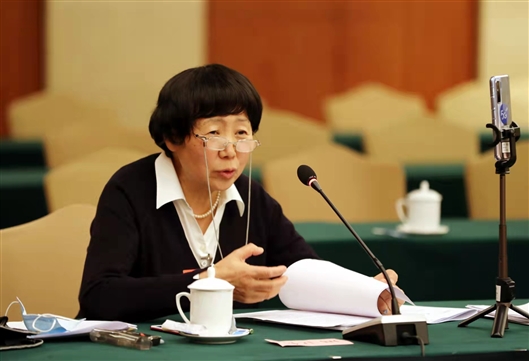
"Developing recycling economy is of great importance in the pursuit of the goals of carbon emissions peaking and subsequent carbon neutrality. Among them, reutilization of solid waste as useful resource is a key direction," ZHOU Weijian, a deputy to the National People's Congress, an Academician of the Chinese Academy of Sciences (CAS), and a researcher of the Institute of Earth Environment of CAS, told China Science Daily during the "two sessions".
Tailings management is one of the difficulties of the mine resource exploitation in China. According to ZHOU, because of the low ore grades and complex components for most of the ores in China as well as the outdated mining production technology commonly used, more than 80% of the mined ores have turned into tailings, with an average annual carbon emission of 1.4 billion tons and a cumulative stockpile of over 20 billion tons of solid waste. Meanwhile, the comprehensive recovery rate of tailings resources is only about 30%; the comprehensive utilization rate is less than 20%, 20% lower than that abroad; and 53% of tailings reutilized is used to refill the mined-out area. Therefore, the amount of high value-added utilization of tailings is very low.
"Actually, oxygen, silicon, aluminum, iron, calcium, sodium, potassium and other major elements account for over 90% in mining solid waste. If those major elements can be extracted and utilized, more than 90% of solid waste will turn to be harmless, reduced and recycled." ZHOU said, the full-resource treatment of solid waste means to turn the solid waste to raw material, and ultimately achieve zero emissions.
Based on long-term scientific research, ZHOU and her team have integrated the geochemistry and metallurgy to develop a new catalyst that can separate major elements and trace elements in tailings, which helps to fully utilize mining solid waste.
Last year, the research team carried out industrial trials by applying the related technologies to the slag (water-quenched slag) at Shaanxi Hanzhong Zinc Industry Company. After more than a month, they found that by using the new catalyst, all the solid waste can be extracted and converted to valuable products at 250 °C (one-fifth of the ore smelting temperature), and the re-utilization rate reached over 90%. This method can not only fully reutilize the tailings, but also cover the cost of resource recovery and make a net profit of 450 yuan per ton.
She explained that the main products obtained from tailings, such as silica gel, water glass, water retention agent, water purifier, etc., are not only widely used in industry, agriculture, and daily life, but are also the raw materials for waste-water treatment in industrial bases such as energy resources, coal/petro-chemical industry and non-ferrous metallurgy, etc. Additionally, they are useful to the soil and water conservation, sand and soil fixation, and ecological restoration in wider areas.
In the next step, she hopes to apply the related technologies to the comprehensive utilization of tailings from pyrite mine in Baihe County, Shaanxi Province. The widely distributed abandoned pyrite mines in Baihe County have caused pollution to the headwater of Han River, attracting the attention of the state governments.
In this interview, ZHOU pointed out that there are still some difficulties in the management of the full resource utilization of mining waste. Developing the related technologies is difficult and needs large funding, and there is only input but no output in the early stage of tailings reutilization. So, the enterprises lack motivation to reutilize mine waste, and many closed mines are unable to deal with tailings.
To speed up the full resource utilization of solid waste in China, she provided some suggestions as below. Strengthen the policy support with increased funding to promote the development of new technologies; establish pilot base for the related technologies; introduce social capital and diversify the funding approaches; adopt the rule of “whoever invests will benefit”, and encourage private capital to invest in relevant pilot areas by tax incentives and other policy measures.
ZHOU said, supporting enterprises to implement technologies related with full resource utilization of solid waste in place can reduce the transportation cost of solid waste and products, and is conducive to promoting the management of sand and soil fixation after mining, and to achieving "zero emissions" of solid waste. She suggested that with the industrial park as the fulcrum, the urban agglomeration or the regional economic circle as the carrier, through the cultivation of leading enterprises, the coordinated utilization of solid waste in multiple industries will be promoted, and the ecological restoration and high-quality development will be facilitated. (Text from China Science Daily)

ZHOU Weijian speaks on The National People's Congress (Credit by ZHOU)

86-10-68597521 (day)
86-10-68597289 (night)

52 Sanlihe Rd., Xicheng District,
Beijing, China (100864)

